Considering using ecommerce platforms to level up your online store?
Though, trying to pick the best one for your business is causing a serious case of analysis paralysis.
Luckily, there’s a cure…
We’ve compiled a list of high-quality ecommerce platforms perfect for various online business owners.
These platforms will make an online store easier to run while being more efficient and profitable. By the end of this post, you’ll know which one works best for your situation.
So, in alphabetical order, let’s dive into the list!

1. Adobe Commerce (Formerly Magento)
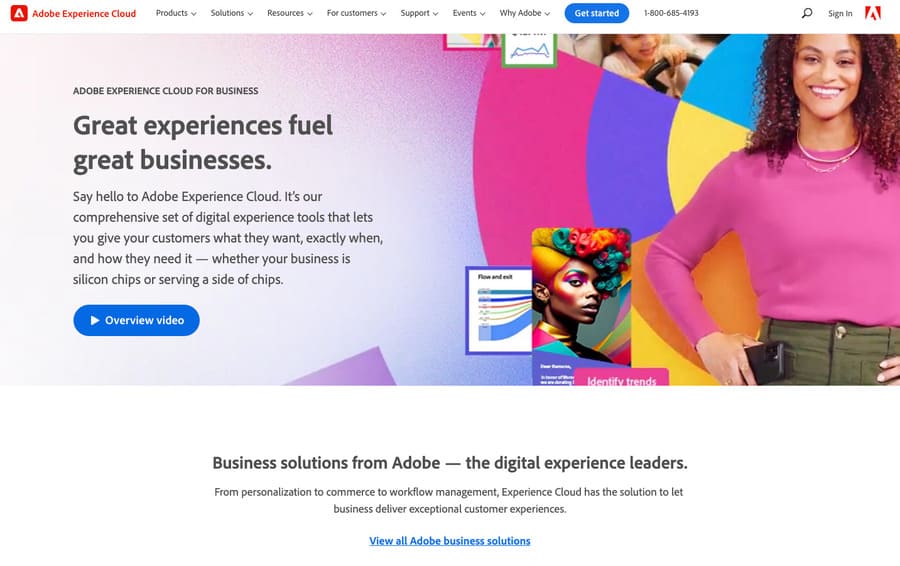
Adobe Commerce is a feature-rich platform that offers excellent scalability, inventory management, and customization options for ecommerce businesses of all sizes.
It stands out as one of the few platforms that offers an open-source option.
Plans & Pricing
With Adobe Commerce, you have two options:
- Magento Open Source — $0
- Adobe Commerce Pro — prices start at around $22,000/yr.
Check out this article for a breakdown of the features between the plans.
No fees are involved with Magento Open Source, although between hosting, maintenance, design work, and extensions, it can cost thousands per month.
With Adobe Commerce Pro, you pay a yearly licensing fee that increases with your business’s value.
Pros
- Open-source structure allows incredible customization and scalability
- Excellent SEO tools
- Extensive amount of features such as advanced catalog management, refund processing, and content staging
Cons
- Coding-intensive learning curve
- Slow without being configured
- High cost
Ideal For
Bigger businesses and customers with a high volume of items will find Adobe Commerce useful.
Why?
Well, they can take advantage of the scalability that Adobe offers.
The heavy framework allows for a business to take hundreds of orders at a time but requires extensive development work to configure properly.
2. BigCommerce
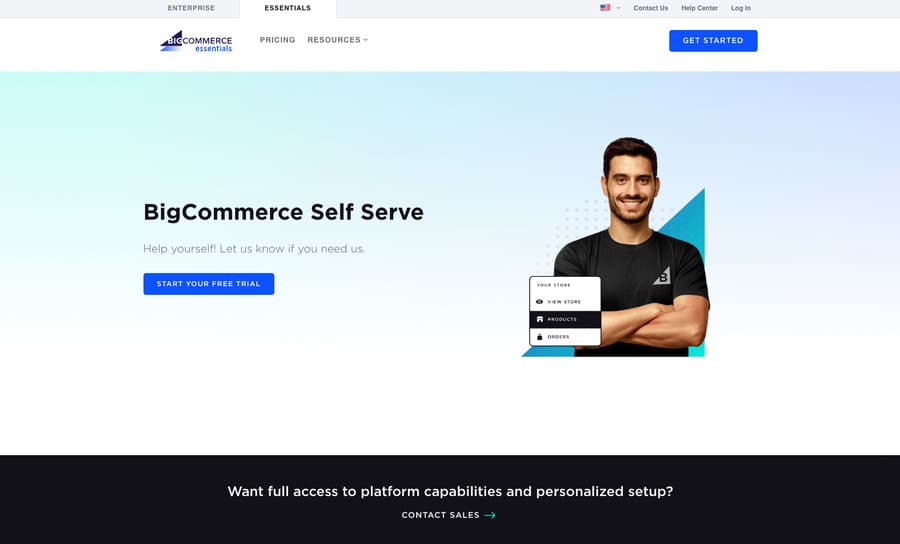
BigCommerce looks out for the little guy with a standard plan that offers more features than the average software-as-a-service (SaaS) ecommerce platform.
It’s also great for big businesses by offering features such as unlimited product listings, sophisticated marketing tools, and the ability to operate multiple storefronts on a hosted platform.
Plans & Pricing
- BigCommerce offers a 15-day free trial.
- Standard Plan — $39/month or $29/month if paid annually
- Plus Plan — $105/month or $79/month if paid annually
- Pro Plan — $399/month or $299 if paid annually
- Enterprise Plan — Contact Bigcommerce for pricing
The cherry on top is that there are no transaction fees included while using the most popular payment methods.
Pros
- Versatility for businesses of all sizes
- Low credit card fees
- Good SEO tools
Cons
- Annual limit on online sales
- Less value with each tier
- Doesn’t offer 1-click selling
Ideal For
The amount of features included in the standard plan makes BigCommerce the best ecommerce platform for a small business.
Though, this is a double-edged sword.
As your business grows you begin paying more for fewer features.
3. Ecwid by Lightspeed
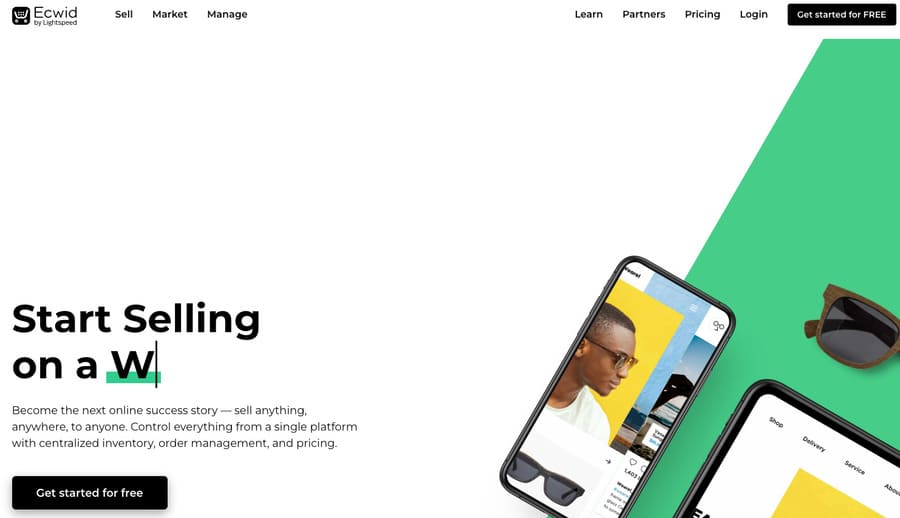
Ecwid is a SaaS ecommerce solution that offers affordable low-risk plans to start your business — they even stand out by offering a completely free plan.
The caveat is that Ecwid’s customization options are limited, even within their premium plans.
Plans & Pricing
- Free Plan — $0/month for 5 product listings
- Venture Plan — Up to 100 product listings for $19/month or $14.08/month if paid annually
- Business Plan — Up to 2500 product listings for $39/month or $29.08/month if paid annually
- Unlimited Plan — Unlimited product listings for $99/month or $82.50 if paid annually
Each tier allows you to sell on new social media sites, list more products, and expand the tools of your business.
Pros
- Free plan available
- A large amount of payment gateway options
- No transaction fees
Cons
- Limited product listings for Venture & Business plans
- Many features are locked behind the higher tiers
- Limited app integrations
Ideal For
New store owners with a small inventory get the most benefit from Ecwid, since it costs nothing to get started.
The limited features of the free plan are enough to get smaller ecommerce businesses up and running.
Check this article out for an in-depth breakdown.
4. Groove
Groove is a newer client relationship management (CRM) platform that includes a number of functions, such as an ecommerce store, a payment system, and web hosting.
It also offers sophisticated marketing automation systems, so you’ll never have to worry about customer inquiries again.
Plans & Pricing
- Lite — Free plan is given for creating an account
- Creator — $149/month or $83/month if paid annually
- Pro — $199/month or $124.25/month if paid annually
- Premium — $299/month or $166/month if paid annually
- Premium+ Lifetime — One-time purchase of $2997 for lifetime access
Pros
- Low cost
- Over 60 customizable design elements to design your site with
- High-quality marketing tools, including a fully automated email response system
Cons
- Inconsistent customer support
- Reports of slow site response times while using Groove’s software
Ideal For
Groove is ideal for small to medium-sized businesses that want to increase conversions and automate their customer relation processes.
Plus, their built-in software integrations work smoothly with the most popular ecommerce, social media, and marketing platforms.
5. Hostinger
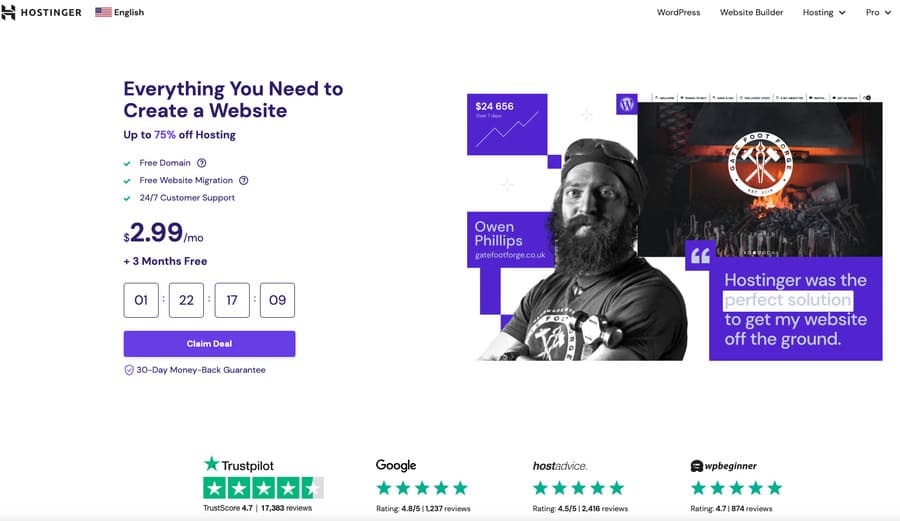
Hostinger offers fast, reliable, and affordable web hosting services for online businesses of all sizes.
With a user-friendly control panel, dedicated customer support, and top-notch security, Hostinger makes it easy to create and manage a website.
Plans & Pricing
- Premium Web Hosting — $6.99/month
- Business Web Hosting — $8.99/month
- Cloud Startup — $19.99/month
Pros
- Low cost
- 24/7 customer service
- Fast loading speed
Cons
- 500 product limit
- Limited domain options
- No built-in payment processing system
Ideal For
The low entry cost makes Hostinger ideal for a small business.
Yet, if your business is growing rapidly, the 500-product limit size will cause you issues.
6. SAP Commerce Cloud
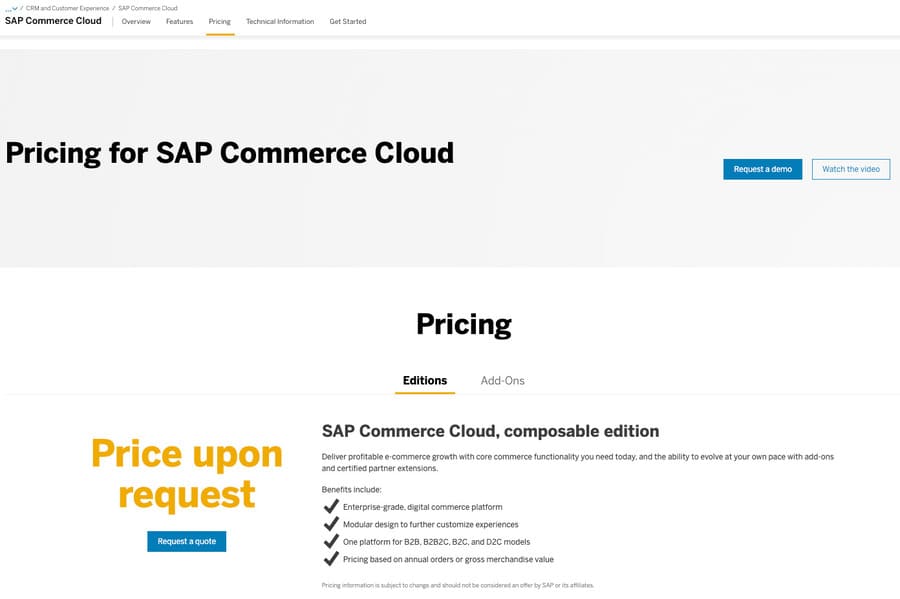
SAP Commerce Cloud offers a range of enterprise-level features that allow you to scale your business to any size.
It has something for every store owner, between supporting multiple sales channels, enabling global businesses, and providing the tools to expand your ecommerce store.
Plans & Pricing
SAP Commerce Cloud doesn’t publicly release the pricing for its services. To find that out, you have to request a quote from them directly.
Pros
- Excellent scalability
- Ability to run larger, more complex businesses
- SmartEdit allows for in-depth customization of content on your website
Cons
- High cost
- Complex systems require technical expertise
Ideal For
SAP Commerce Cloud is an excellent choice for larger B2B companies because it’s great for scaling, customizing an online store, and has multi-channel sale capabilities.
7. Shift4Shop (Formerly 3Dcart)
Shift4Shop is an all-in-one ecommerce platform that offers everything you need to build, launch, and grow your online store.
With advanced features such as unlimited product listings, secure payment processing, and customizable themes, Shift4Shop makes it easy to scale your business.
Plans & Pricing
Shift4Shop keeps it simple by only having one premium plan to suit all your needs.
The unique part is that you can have this plan for free!
Well not quite free — it requires $500 in processed sales every month.
Or you can pay a $29 monthly fee.
Pros
- Competitive pricing
- Customizable themes
- Wide range of features and tools for promotional purposes, search engine optomization, and inventory management
Cons
- Steep Learning curve makes using the tools difficult for first-timers
- Limited design flexibility
- Transaction Fees
Ideal For
Shift4Shop is ideal for businesses that have a wide range of products within different industries.
The customizability of its features also allows it to handle the complex nature of businesses that deal in multiple niches.
8. Shopify

Shopify is one of the most versatile ecommerce platforms, offering a range of plans.
Whether it’s supporting a small online shop and blog with the Basic Plan, or an enterprise-level business in need of something more with Shopify Plus, this platform can do it all.
Plans & Pricing
When it comes to subscription plans, Shopify gives you more options than the average ecommerce platform:
- Starter — $5/month
- Basic — $39/month or $25/month if paid annually
- Shopify — $105/month or $65/month if paid annually
- Advanced — $399/month or $344/month if paid annually
- Shopify Plus — Starting at $2000/month
Prices vary for Shopify Plus since they work with you to personalize your plan.
Pros
- No transaction fees through Shopify Payments
- Very fast load times
- Easy website set-up
Cons
- High monthly cost
- Additional fees for select software integrations
Ideal For
Given the range of plans available, businesses of all sizes will find Shopify an excellent choice.
Yet, larger companies may benefit the most.
The advanced ecommerce functionality allows for complex integrations, and the scalability lets you build your store into an enterprise-level business.
9. Weebly & Square Online

Weebly is another ecommerce platform specializing in making it easy to build and customize an online store.
Its dominant feature is its point-of-sale integration, thanks to being a part of Square Online.
Though, this collaboration between the two means you have to make an account with Square Online to use Weebly.
Plans & Pricing
- Free Plan — $0/month basic uses
- Personal — $10/month
- Professional — $12/month
- Performance — $26/month
Pros
- Multilingual accessibility
- Excellent website analytics give you real-time stats on things like your site’s traffic patterns
- Simple point of sale integration
Cons
- Reliance on plugins
- Limited to only credit card and PayPal for payments
- Template limitations
Ideal For
If you’re in need of a quick and cost-effective ecommerce solution, then Weebly is for you.
After all, it covers the basics and is reliable.
10. Wix
Wix ecommerce is an easy-to-use website builder thanks to its simplified website editing, collection of customizable templates, and ability to support a variety of websites.
Wix also offers SEO tools and a robust market of apps designed by both users and Wix themselves, making it a top choice for building a successful online presence.
Plans & Pricing
- Combo Plan — $16/month
- Unlimited Plan — $22/month
- Pro Plan — $27/month
- VIP Plan — $45/month
Pros
- Extensive amount of apps to enhance your site-building
- Wide range of templates allows for creative flexibility with website design
- Sophisticated SEO tools
Cons
- Slower load times
- Risk of losing work by switching templates
Ideal For
Online businesses that have a need for both functionality and aesthetics will be a perfect match for Wix ecommerce.
If your business’s blog section is as important as its store, Wix is the way to go.
11. WooCommerce
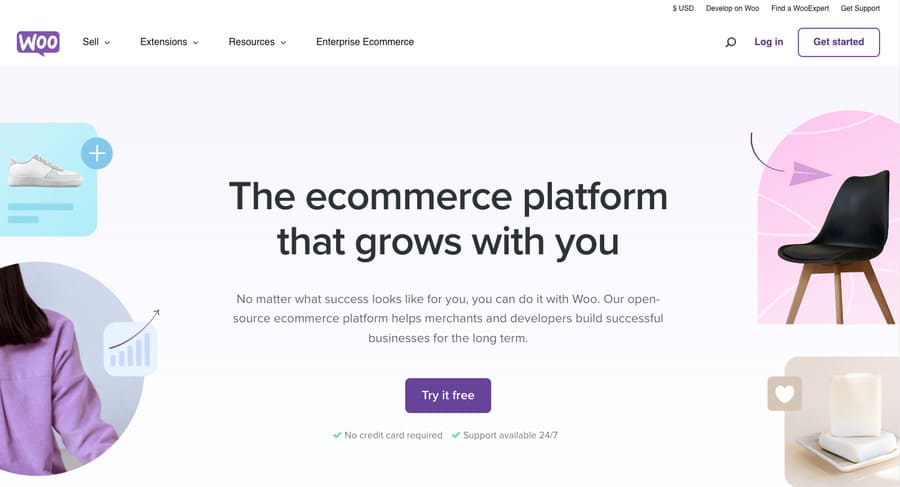
WooCommerce is a powerful and flexible ecommerce platform that makes selling online a breeze for businesses.
Its stand-out features include seamless integration with WordPress, customizable themes & plugins, and built-in payment methods.
Plans & Pricing
WooCommerce doesn’t have a set plan that you have to pay for — the platform itself is open-source, running on WordPress.
Instead, the price that you’ll have to pay comes from other things like your domain name, the plugins you use, or site maintenance.
Pros
- Cost-effective due to being open source
- User-friendly interface simplifies the website-building process
- Easy WordPress integration
Cons
- Less effective security
- Stronger reliance on plugins
- Requires more upkeep
Ideal For:
Because WooCommerce is open-source, it’s most useful for businesses that are trying to cut down on operating costs. Ultimately, it’s one of the few free ecommerce platforms.
This is especially for businesses that already have a WordPress site and just need to integrate an ecommerce functionality.
Selecting the Right Ecommerce Platform for Your Online Store
When looking at ecommerce platforms for your online store, keep in mind your business needs.
Look for a platform with robust features, an easy-to-use interface, responsive customer support, and a strong reputation.
Now that you have the knowledge, analysis paralysis is a thing of the past.
So, take that next step and commit to building your business on the back of a platform that works for you!
The post 10+ Best Ecommerce Platforms to Get Profits Rolling in 2023 appeared first on Smart Blogger.

No comments:
Post a Comment